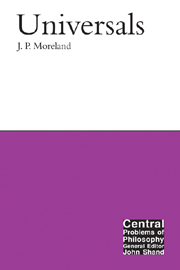Book contents
- Frontmatter
- Contents
- Preface and acknowledgements
- 1 The problem(s) of universals
- 2 Extreme nominalism and properties
- 3 Moderate nominalism and properties
- 4 Minimalist realism: Wolterstorff's kinds and Armstrong's properties
- 5 Traditional realism: properties are abstract objects
- 6 Traditional realism: issues and objections
- 7 The individuation of particulars
- Notes
- Bibliography
- Index
6 - Traditional realism: issues and objections
- Frontmatter
- Contents
- Preface and acknowledgements
- 1 The problem(s) of universals
- 2 Extreme nominalism and properties
- 3 Moderate nominalism and properties
- 4 Minimalist realism: Wolterstorff's kinds and Armstrong's properties
- 5 Traditional realism: properties are abstract objects
- 6 Traditional realism: issues and objections
- 7 The individuation of particulars
- Notes
- Bibliography
- Index
Summary
In Chapters 2 and 3, reasons were given for preferring realism over both schools of nominalism. In Chapters 4 and 5, different versions of realism were analysed, and traditional realism was clarified and defended. Still, there are objections to realism – traditional or otherwise – yet to be considered. Moreover, intriguing topics surface in developing a mature realist position on properties and their instances. It is impossible to cover all the relevant topics in one short chapter or, indeed, in one book. So the discussion to follow will be limited to subjects that regularly arise in the literature and that are interesting in their own right. The first section contains an examination of three arguments against realism and the second presents two issues that are part of a developed realist ontology, viz. the existence of uninstantiated universals and the relationship between properties and existence.
Three objections to realism
Three objections to realism surface frequently: realist vicious regresses, problems with identity conditions for properties and difficulties reconciling naturalism with knowledge of abstract objects.
The realist vicious infinite regresses
Three regress arguments have been raised against realists: the third man argument; an argument focusing on an ascending hierarchy of exemplificational properties; and an exemplification relational regress argument. The third man argument was discussed in Chapter 1 and will not be examined here.
The hierarchy of exemplificational properties argument goes like this. According to realists, when some object a has a property being F, then this is to be explained as a exemplifying F-ness.
- Type
- Chapter
- Information
- Universals , pp. 114 - 139Publisher: Acumen PublishingPrint publication year: 2001

